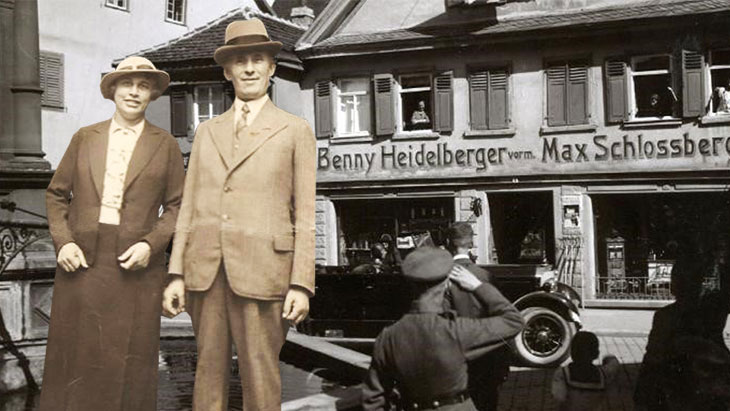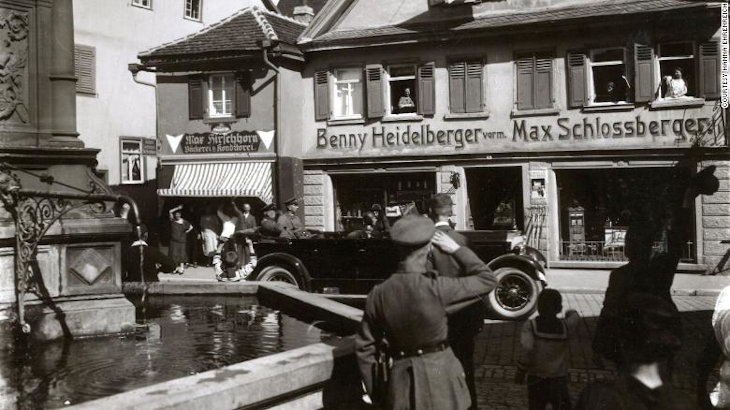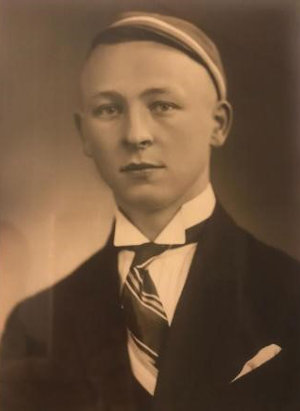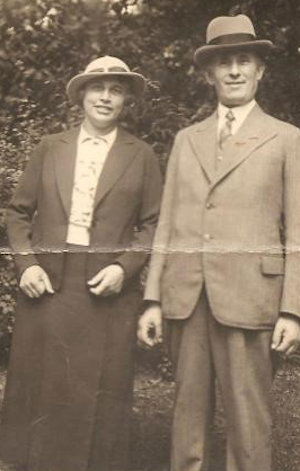 Iran’s Attack on Israel
Iran’s Attack on Israel


8 min read
Thomas Edelmann apologized to Hanna Eherenreich, the granddaughter of the Jewish businessman victimized by his Nazi grandfather.
Israeli retiree Hanna Ehrenreich grew up keenly aware of her family’s German Jewish heritage.
Her parents moved to present-day Israel from Germany in the 1930s, before her birth, and they continued to speak German at home – Hanna grew up conversing in German with her parents and her beloved grandparents. She became a teacher and now, at the age of 83, still honors the memory of her family’s long-ago life in Germany. An old black and white photo of the hardware store that her grandfather once owned in Germany even hangs on a wall in her home in Israel.
Recently, Hanna received a remarkable message. Thomas Edelmann, 49, lives in Germany with his family, and he wanted to get in touch. Years ago, in 1938, Hanna’s grandfather was forced to sell his business far below the market price. Jews were being persecuted across Germany, and the 1938 Nazi Nuremburg Laws mandated Jews sell their properties or businesses to non-Jewish buyers. Many opportunistic Germans, like Thomas Edelmann’s grandfather, took advantage, buying companies and other assets from Jews at bargain basement prices.
Thomas wanted to apologize for the wrong his grandfather did.
“I believe that if my family supported the injustice your grandparents experienced,” he wrote, “it is our duty to take this into account and take over responsibility at least in getting in touch with you to listen and learn. As I am part of the Edelmann family I want to take the first step and listen to you.”

“I do understand that you might not see any benefit yourself personally in talking to me. But with me understanding and being able to teach my children and possibly other family members about the impact of particular historical decisions, this might help them to make better decisions in their lives,” Thomas explained.
“Currently, the political climate in our country is poisoned,” he continued, as CNN reported. “There is a new antisemitism upcoming. I want to make sure that at least my family will never again be responsible for injustice experienced by others, but stand up to take the part of the weak.”
Hanna Edelman read Thomas’ note and replied that she agreed to speak with him. Though Thomas had initially written to Hanna in English, assuming that the Israeli-born woman didn’t know any German, Hanna explained she’d grown up speaking German with her parents. A few weeks later they had a surprising heart to heart phone conversation that lasted an hour and a half.
“It was a very good conversation,” Hanna told journalists afterwards. She told Thomas about her Jewish grandparents, Benjamin and Emma Heidelberger, and was even able to read him some passages of a diary that her grandfather kept in which he described the forced sale of his business to Thomas’ grandfather. It wasn’t only his store that they were forced to sell: the Heidelbergers were also compelled to sell their house to Thomas’ grandfather. Though he’d suffered enormously, Hanna’s grandfather’s journal revealed a positive, optimistic man.
“My business successor, Wilhelm Edelmann, came every first of the month to pay the rent,” Hanna’s grandfather confided to his journal, “and even though he was a member of the Nazi party, he was a decent man and not an anti-Semite. In the Fall of 1937, we sold him our house for 10,000 Reichsmark, though my asking price had been 15,000. In July 1938, we sold our shop and warehouse for the bargain price of 28,500 Reichsmark, the same sum for which I had bought it 30 years earlier. Under different circumstances, I could have sold it for 40,000. But back then many Jewish businesses in Bad Mergentheim were sold under value.”
Hanna’s grandfather’s descriptions of being fleeced by Wilhelm Edelmann seemed to confirm Thomas’ harsh views of his Nazi grandfather. Thomas’ parents divorced when he was young, and he lost contact with his father and his father’s side of the family – including the relatives who today continue to own the building Hanna’s grandfather was forced to sell. Thomas always knew that his grandfather was a member of the Nazi Party and profited from the Nuremberg Laws. Though he has no connection with his family’s business, the fact always rankled him.
 Wilhelm Edelmann
Wilhelm Edelmann
Through the years, Thomas researched his family tree and located commercial records for his grandfather’s store. He learned about Benjamin Heidelberger and the way he and other Jews were forced to sell their property. Thomas assumed he’d never be able to find Benjamin Heidelberger or his heirs. Given the horrendous fate of most of Germany’s Jews, it was entirely possible that he’d never survived.
A few weeks ago, Thomas was speaking with a salesman from the genealogy company MyHeritage, which he’d used to help dig into his family history. He mentioned his grandfather’s business and described how Benjamin Heidelberger was forced to sell it. The salesman was intrigued and related the story to MyHeritage’s research department.
Two weeks later, a representative from MyHeritage phoned Thomas back: they’d found records of Benjamin and Emma moving to Israel, and even located their gravesites in northern Israel. They told Thomas that their granddaughter Hanna Ehrenreich was still alive and encouraged him to send her a message through the company’s website. Now, incredibly, he was finally speaking with Benjamin Heidelberger’s heir, learning all about her family and hearing tales of his own grandfather as well.
 The Heidelbergers in Israel
The Heidelbergers in Israel
Some of what Hanna told him was shocking. She described how her grandfather felt gratitude towards his grandfather. “One day,” he wrote in his diary, “Edelmann came to me and said I should leave Germany as quickly as possible. There were plans in place to act against Jews and he felt obliged to warn me, his good acquaintance.”
The Heidelbergers used the paltry proceeds they’d been paid for their property to flee the country for Israel, leaving Germany just weeks before Kristallnacht, the “Night of Broken Glass” anti-Jewish pogrom that consumed Germany and Austria on November 9 and 10 in 1938. During those horrific days, the small Jewish community of Bad Mergentheim was terrorized. The rabbi of the community, Rabbi Dr. Moses Kahn, was beaten up and the town’s synagogue was ruined. All of the Jewish men in the town were arrested and sent to Dachau. The Heidelbergers were lucky in escaping, but most other German Jews were trapped. Hanna’s other grandparents, for instance – her mother’s parents – never made it out of Germany and were murdered by the Nazis.
 Thomas Edelmann and his son Finn
Thomas Edelmann and his son Finn
Hanna told all this to Thomas and relayed that she’d even visited the store in the 1980s when she and her family took a trip to Germany and stopped in Bad Mergentheim, which today is home to a chain of stores called Edelmann. “I knew Edelmann was indeed the person who bought the shop,” she later explained. “I understood that he was a good man, although he was a member of the Nazi party.”
By the end of their conversation, Thomas was nearly in tears. “He was very moved and said he was so happy to hear the story from my side – he was almost crying,” Hanna described. “It was such an emotional moment when I heard Hanna on the phone and when she told me about her grandfather,” Thomas said. “Although her family was treated so badly she was very friendly and didn’t hold me responsible for anything.”
Despite Hanna’s assurances, Thomas still harbors doubts about his grandfather’s character. “I know my grandfather was a very good businessman. When he was a student during the 1920s he was already a member of the Nazi party, which was before Hitler came to power. So I don’t believe he was such a good man. I’m not 100% convinced.”
For Thomas, speaking with Hanna was a crucial part of coming to terms with his family’s history – and with his nation’s shameful past. His son Finn, 15, is beginning to learn about Germany’s Nazi legacy. “I want him to understand what history is, and what history means,” Thomas notes. “It’s our ancestor who has impacted the lives of a whole family who had a life in this country. I want him to learn and understand that whatever decisions he makes has an impact on someone else’s life.”
Thomas and Hanna plan to keep in touch and Thomas hopes to visit her in Israel. Meanwhile, Hanna had a powerful message – her family who made it to Israel has blossomed in the Jewish state. “Thomas wanted to hear how we had been,” she observed. “I said we were happy, and we have had a good life.”
